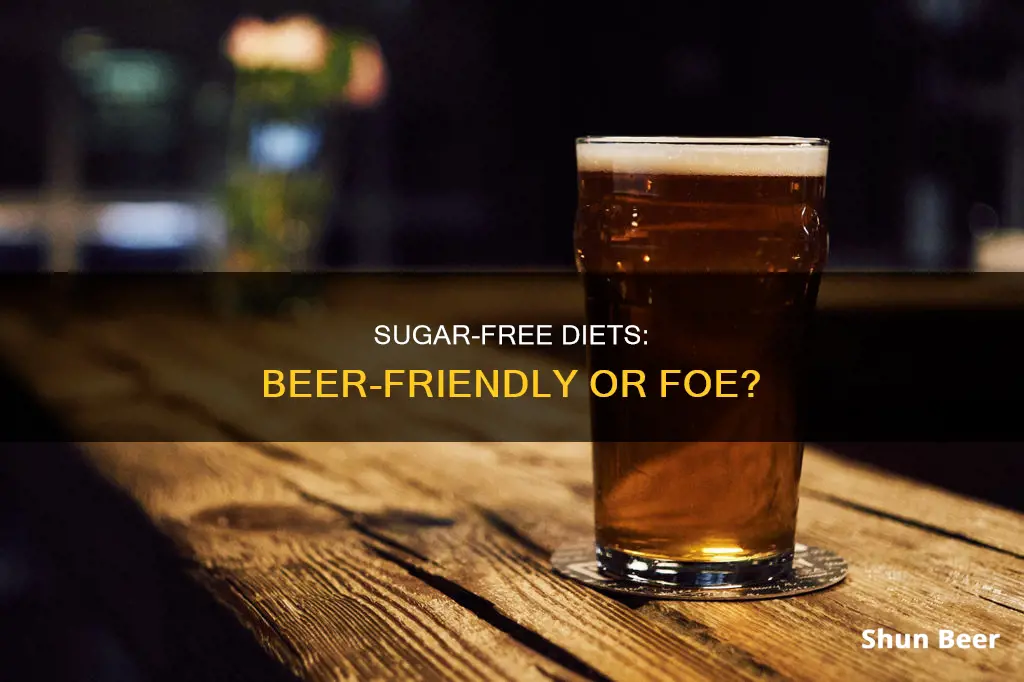
Beer is a significant source of carbohydrates, so it can impact blood sugar levels. Depending on the type, it can also be high in calories, so drinking beer may contribute to weight gain over time. Some types of beer can be higher in alcohol, too. The liver prioritises clearing alcohol from the body, so drinking alcohol can slow down the metabolism of carbohydrates, potentially leading to low blood sugar (hypoglycaemia).
However, beer does not tend to contain fructose, and most beers do not have any added sugar. Beer contains maltose, which is less sweet than table sugar and fructose, and our bodies can metabolise it better. Beer is also relatively low in sugar content because, during the fermentation process, the sugar in the grains is broken down into alcohol and other byproducts.
What You'll Learn
- Beer is a significant source of carbohydrates, so it can impact blood sugar
- Beer can be high in calories and may contribute to weight gain over time
- Drinking alcohol can slow down carb metabolism, potentially leading to low blood sugar
- Beer contains very small amounts of vitamins and minerals such as B vitamins, calcium, magnesium and phosphorus
- Non-alcoholic beers are healthier than alcoholic beers, but they still have little nutritional value

Beer is a significant source of carbohydrates, so it can impact blood sugar
Beer is a staple beverage for many, but it is important to be aware of its nutritional content, especially if you are monitoring your sugar intake. Beer is a significant source of carbohydrates, which can impact blood sugar levels.
Beer is made from water, grain, hops, and yeast. The grain used is typically malted barley, which is the source of the sugar in beer. The yeast enables the fermentation of the sugars in the malted barley to form alcohol. This process turns sugar into alcohol, but beer still contains a type of sugar called maltose. Maltose is less sweet than table sugar and fructose, and our bodies metabolize it better. However, it is still high on the glycemic index (GI), which measures how much a food increases blood sugar levels.
A 12-ounce can of beer typically contains 13 grams of carbohydrates. In comparison, a can of Budweiser has 10.6 grams of carbs, while Budweiser Light contains 4.6 grams. Non-alcoholic beers tend to have even higher sugar content, with some containing up to 29 grams of carbohydrates.
The impact of beer on blood sugar levels is particularly relevant for people with diabetes. When a person has diabetes, their body struggles to get sugar into the bloodstream for the cells to utilize. This can lead to hyperglycemia, where there is too much sugar in the blood, which can damage organs and body tissues. Drinking alcohol can also cause hypoglycemia, or low blood sugar, because the liver, which stores glucose, is busy clearing alcohol from the system. Therefore, drinking beer can significantly affect blood sugar levels and must be treated accordingly.
For those monitoring their sugar intake, it is important to note that beer can be high in calories and carbohydrates. Additionally, some specialty "flavoured" beers may contain added sugars. Therefore, while beer does not tend to contain fructose, its maltose and carbohydrate content means that it can impact blood sugar levels and should be consumed in moderation.
Endoscopy and Beer: What You Need to Know
You may want to see also

Beer can be high in calories and may contribute to weight gain over time
Beer is a staple beverage for many, but it's important to be aware of its nutritional content, especially if you're watching your weight. Beer can be high in calories, and drinking it regularly may contribute to weight gain over time.
A 12-ounce can of beer typically contains around 13 grams of carbohydrates, and its calorie count can vary depending on the brand and type. For example, a can of Budweiser has 146 calories, while a Bud Light has 103. These extra calories, if not burned off, can lead to weight gain.
The production process of beer is also a factor. Beer is made by fermenting grains, which means that microorganisms, usually yeast, break down the sugar in the grains into alcohol and other byproducts. This process results in beer containing very few vitamins and minerals, such as B vitamins, calcium, magnesium, and phosphorus.
Additionally, the type of beer you choose matters. Regular beer tends to be higher in calories and carbohydrates than light beer. Non-alcoholic beer, on the other hand, often has even more sugar, with some brands containing up to 29 grams of carbohydrates.
When it comes to weight gain, it's not just the beer itself that's the issue. The snacks and foods we often pair with beer can also be high in calories and contribute to weight gain. For example, a pint of beer with a side of loaded nachos can quickly add up in terms of calories and fat content.
Furthermore, beer's impact on blood sugar levels can also indirectly affect weight gain. Drinking alcohol can cause hypoglycemia or low blood sugar, as the liver, which stores glucose, is busy clearing alcohol from your system. This can lead to increased cravings for sugary and carb-heavy foods, which, if consumed, can contribute to weight gain.
So, while you can certainly enjoy a beer or two, especially in moderation, it's important to be mindful of its calorie and carbohydrate content, especially if you're watching your weight. Opting for light beers or non-alcoholic options and being mindful of your food choices when drinking beer can help mitigate the potential impact on your waistline.
Beer and Ketosis: What You Need to Know
You may want to see also

Drinking alcohol can slow down carb metabolism, potentially leading to low blood sugar
Alcoholic drinks vary in their nutritional content, and it is important to be aware of this when considering a sugar-free diet. Beer, for example, is typically high in carbohydrates, with 3-12 grams of carbs per 12-ounce (355-ml) serving. The grain used to make beer, usually malted barley, is the source of its sugar content.
When considering drinking alcohol on a sugar-free diet, it is worth noting that alcohol is prioritised over other nutrients for metabolism in your body. This means that when you drink alcohol, your body metabolises it before other nutrients to use it as fuel. This can slow down the metabolism of carbohydrates, fats, and proteins, potentially leading to low blood sugar.
The liver, where glucose is stored and released into the bloodstream, is responsible for clearing alcohol from your system. When you drink alcohol, the liver may be delayed in releasing necessary sugars into the bloodstream, potentially leading to low blood sugar or hypoglycemia. This can be dangerous for people with diabetes, especially if they are taking medication, as they may be less able to recognise the symptoms of low blood sugar, which can include dizziness, lightheadedness, and, in more extreme cases, loss of consciousness.
If you are on a sugar-free diet, it is important to be mindful of the potential impact of alcohol on your blood sugar levels and to drink in moderation. Pure forms of alcohol, such as whiskey, gin, rum, and vodka, are all completely free of carbohydrates and can be enjoyed in moderation. Wine and light beer are also relatively low in carbohydrates, usually containing fewer than six grams per serving. However, it is important to note that alcohol is rich in empty calories and can contribute to weight gain and nutritional deficiencies over time. Therefore, it is recommended to limit alcohol consumption to one to two drinks per day, with days of the week dedicated to abstinence.
Beer During Lunch: Is It Okay?
You may want to see also

Beer contains very small amounts of vitamins and minerals such as B vitamins, calcium, magnesium and phosphorus
Beer is a significant source of carbohydrates, so it can impact blood sugar levels. Beer also tends to be high in calories and carbohydrates, but it is relatively low in sugar content. This is because the sugar in beer is mostly maltose, which is less sweet than table sugar and fructose, and is metabolised better by the body. Beer also contains very small amounts of vitamins and minerals such as B vitamins, calcium, magnesium and phosphorus.
Beer is made from water, grain, hops, and yeast. The grain is usually malted barley, which is the source of the sugar in beer. The yeast enables the fermentation of the sugars in the malted barley to form alcohol. Essentially, the process turns sugar into alcohol.
Most beers do not have any added sugar, but flavoured beers will often have added sugars to create special flavours. Non-alcoholic beers, on the other hand, tend to have much higher sugar content, with some containing up to 29 grams of sugar.
While beer does contain small amounts of vitamins and minerals, it is not a significant source of nutrition. Beer is also high in "empty" calories, which can contribute to weight gain over time. Excessive drinking may also contribute to other serious health conditions, including liver problems, cancer, and heart disease. Therefore, it is important to consume beer in moderation.
Neoprene Beer Coolers: How Do They Work?
You may want to see also

Non-alcoholic beers are healthier than alcoholic beers, but they still have little nutritional value
It's important to note that alcoholic drinks are a nutritional minefield, with a wide variety of types and brands, each with its own nutritional label. Beer is a staple beverage enjoyed by many, but it is a significant source of carbohydrates and can impact blood sugar levels. It can also be high in calories, depending on the type, and contribute to weight gain over time.
Non-alcoholic beers, on the other hand, are a healthier alternative to their alcoholic counterparts. By removing the alcohol, you reduce the risk of chronic diseases associated with alcohol consumption. However, non-alcoholic beers still offer very little nutritional value and are mostly carbohydrates. They tend to be lower in calories, but it's important to remember that they are not calorie- or carb-free.
While non-alcoholic beers may not get you buzzed, they can still impact your health. They often contain trace amounts of alcohol, and it's crucial to check the labels to make sure they align with your personal health goals. Additionally, some non-alcoholic beers contain added sugar, which should be consumed mindfully.
When it comes to sugar-free or low-sugar diets, alcohol can be a tricky area. While most unmixed alcohols contain little to no sugar, beer can contribute to your sugar intake due to the maltose from malted barley used in the brewing process. However, beer typically does not contain fructose, and regular beers usually have zero grams of sugar.
If you're looking for low-sugar alcoholic options, hard spirits like gin, vodka, whiskey, and rum are good choices, but watch out for mixers. Wine is also an option, with red wine being the best choice, followed by dry white wine. Beer might be good for low sugar, but it can be high in calories.
In summary, non-alcoholic beers are indeed healthier than alcoholic beers, but they still offer minimal nutritional value. They are a good option for those looking to reduce their alcohol intake while still enjoying the taste and experience of beer. However, it's important to be mindful of their calorie and carbohydrate content and consume them in moderation.
Beer and Epidural Steroid Injections: What's Safe?
You may want to see also
Frequently asked questions
Yes, you can drink beer on a sugar-free diet, but in moderation. Beer is typically low in sugar content but high in calories and carbohydrates.
The recommended daily sugar intake from the NHS is 50 grams for women and 70 grams for men.
Low-sugar alcoholic drinks include hard spirits like gin, vodka, whiskey, and rum. Wine is also a good option, especially red or dry white varieties.







